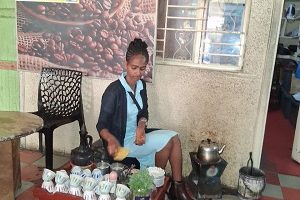
There are many kinds of traditional fermented beverages in Ethiopia, not only of animal origin, but also of plant origin. In everyday life people enjoy fermented beverages and particularly when holydays and having guests, they like to treat them to traditional alcoholic beverages like Tella, Tej, Areki, Borde, and Shamita are drinks that each household brews to treat guests.
Substrates for their production are from locally available raw materials. Therefore, the basic production method is the same, but the tastes may vary. One of the most consumed fermented alcoholic beverages is Tella, which is made mostly with barley but wheat, maize, sorghum, and Teff are utilized depending on the region. As the Ethiopian economy improves, more people drink western style beers. Tella” is a popular Ethiopian traditional beverage, which is made from diverse ingredients. “Tella” has various contents in the various regions and it is based on substrates such as barley, wheat, maize, millet, sorghum, “Teff,” or other cereals.
The earthen clay pot container “Insera” in Amharic is washed with water and leaves of “grawa” several times. Then, the cleaned container is inverted over smoking wood fragments of “weyra” for about 10–15 minutes. This will remove microorganisms sensitive to wood smoke and adds the desired flavor to product. “Bikil” (malt), the source of amylase from corn or barley or wheat grain is moistened in a container and left to germinate for about three days and finally sun-dried. The gesho plant, local hops, which is widely cultivated in Ethiopia and is available in the dried form in the local market. Kita is broken into small pieces. Barley flour is separately toasted on a metal pan sprinkling water on it during toasting until it turns dark brown. This is called enkuro. The color of “tella,” which may vary from light yellow to dark brown, is determined by the extent of baking and roasting the inputs called enkuro. This mixture of enkuro, the rest of the malt, some hops, and water are added to the container. The mixture is kept covered overnight, after which more water is added, and the container is kept sealed for 5 to 7 days, until the beverage is ready. “Tella” can be kept for 10 to 12 days.
Tella used to be one of the most favorite traditional beverages across Ethiopia. It is also found in urban and rural parts of the country. It is mainly prepared from Maize, Teff, Sorghum, barley, wheat or Moge and Serena. Moge and Serena are similar to Sorghum but different. It also has Gesho and malt which is used for the fermentation process with the help of lactic acid that makes tella. In this regard, depending on the regions, the raw materials are different from each other but there always exist Gesho and malt. Therefore, highland people use Barley and wheat while the lowlands mostly use Sorghum, maize and the like, but it takes a similar process. However, tella is not yet commercialized and uses a modern preparation system.
In the whole manner, preparing Tella is the responsibility of women but mostly drunk by men. Depending on its purpose tella is prepared to sell, guests treat, or family drinks it.
During the yearly wedding anniversary or religious ceremony, tella is drunk by people without any fee, rather they enjoy traditional dance. As part of this, during the debbo and grain harvest period, participants are drinking tella in a round table while eating food.
However, it is different from that of selling purposes. Mostly, economically poor mothers are actively engaging in the fields so as to fight many economic problems while helping for independence.
Shega Gebrie is one of the thousands of Ethiopian women who make a living by brewing and selling Tella. Once a misunderstanding occurred with her husband and it is the means of divorce, Shega left her birth place in Gojjam to Addis Ababa in order to make a better living. However, it is not as easy as she expected, it is rather risky and very difficult.
According to Shega, she has spent nine years as a domestic servant here in the capital. It is seriously difficult for women especially those who are domestic servants as they are exposed to various forms of violence. Following an advice from her uncle she decided to run her own business by brewing a local beer called Tella. It is one of the traditional, usually homemade alcoholic drinks frequently drunk across the country.
Before starting up her own Tella store, she had only 2,000 birr start up. While she covered the shop rent, her uncle supported her by providing some tools for the brewing of Tella.
“When I started the store a year ago, it was not able to make more than 150 Birr per day. But the income grew up with the increment of customers gradually.’’
Currently, she is able to make an average of 6, 00 birr per day which is enough to cover her subsistence and buy dress and stationery to her daughter who lives back home in Gojjam.
Though there are many alternative beverages in large cities like Addis Ababa they not affect the business of traditional beer, it rather needs a better of production. However, it does not mean that no problem exists in the process of making and selling Tella. Particularly, absence of a house for selling the drink is a serious problem as she pays 1,000 birr per month, Shega added.
Meanwhile, many women are engaged in such types of fields who frown on so many faces that leave from it and stand for self-reliance. Similarly, a lot of students who have realized their goals depend on their mothers from selling tella as means of income.
Tella has not been internationally commercialized yet, so the process has not been standardized and modernized. Considering the case of Korean makgeolli and the Ethiopian creativity of utilizing gesho in tella, Ethiopia should pay more attention to tella for globalization.
Addis Ababa culture art and Tourism Bureau heritage study and preservation expert Mekbeb Gebremariam says different regions well known at some drinks like Gojam’s Tella and Arekei, Gondar’s Tij, and south’s Borde and others. All the societies drinks those traditional drinks but some drinks are exists in a wealthy family like Tij, others are exists in all societies house; in most of rural part of Amhara region they drink Tella every day and they use it like a water.
The Ethiopian Herald May 16/2020
BY MESERET BEHALU and BETHLHEM ASFAW




